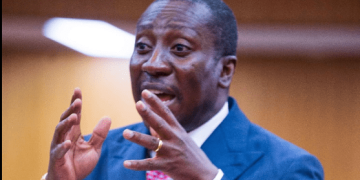Commissioner-General of the Ghana Revenue Authority (GRA), Julie Essiam, has disclosed the Authority is implementing a comprehensive review to consolidate tax collection, which has become imperative to reduce the possibility of loopholes in the tax net.
She also disclosed that geospatial intelligence technology is being implemented to close Ghana’s porous borders and reduce smuggling.
Madam Julie Essiam disclosed these when she appeared before the Public Accounts Committee Sitting on Monday, July 29, 2024.
According to her, different factors account for the loss of taxes and not just smuggling hence the need to address loopholes. She, however, cautioned that the timeline for these changes remains uncertain.
She said, “I’m not able to say that it will happen this year or in 2025. Whatever we implement has to be backed by policy, and we need to have that conversation with our mother Ministry.”
She confirmed that the COVID-19 pandemic tax and the Electronic Transfer Levy (E-levy) are some of the specific taxes undergoing the review process.
The Commissioner-General also outlined strategies for effective tax collection during this election year and stressed that the period is not easy for tax collection.
According to her, the GRA has implemented a focused approach, recognizing the complexities of tax collection during the election period
The GRA, she said, has concentrated on four key areas to enhance collection efforts including strong welfare for staff, building partnerships and transforming the GRA’s image, changing the face of GRA and moving from an enforcement mentality to partnership and collaboration, and improving tax education and engaging with taxpayers directly.
She stated that the GRA has also implemented an e-invoicing system for VAT collection, surpassing its target by bringing on board 614 taxpayers, who contribute 80% of VAT revenue.
She assured that the GRA remains proactive despite having completed the mid-year review and assured of the agency’s commitment to maximizing tax revenue in the year.



















































































